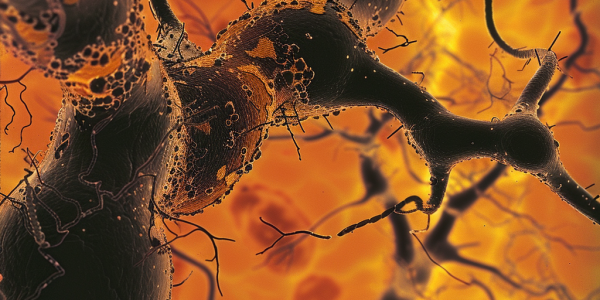Inflammation in Young Adulthood Linked to Cognitive Decline in Middle Age
New research suggests that inflammation in early adulthood may impact cognitive function in middle age. A study by the University of California, San Francisco, found a potential link between inflammation in young adults and cognitive decline later in life. Chronic inflammation, resulting from various factors, has been associated with health issues. The study followed 2,364 participants over 18 years, showing that those with consistently elevated inflammation levels from early adulthood were more likely to have cognitive difficulties in middle age. Lead author Kristine Yaffe emphasized the importance of addressing inflammation early through lifestyle choices to reduce the risk of cognitive decline. This research highlights the long-term consequences of inflammation on brain health and the need for proactive measures to maintain cognitive function as individuals age.
Study Finds Genetic Risk of Alzheimer’s Disease More Influenced by Mother’s Side
A recent study published in JAMA Neurology reveals that the genetic risk of developing Alzheimer’s disease is more influenced by the mother’s side than the father’s side. With the prevalence of dementia expected to nearly double every 20 years, these insights could lead to improved methods of diagnosis, treatment, and prevention. The study, analyzing data from over 4,000 individuals, emphasizes the importance of understanding familial influences on Alzheimer’s risk for developing targeted interventions and treatments.
FDA Approves Eli Lilly’s Alzheimer’s Drug Donanemab
The FDA has approved Eli Lilly’s Alzheimer’s drug donanemab, now marketed as Kisunla, offering hope to the 7 million Americans affected by the disease. Donanemab targets toxic plaques in the brain to slow disease progression, competing with Biogen and Eisai’s Leqembi. Clinical trials showed a 35% reduction in Alzheimer’s progression over 18 months, with monthly infusions costing $12,522 for a six-month course.
Advancements in Alzheimer’s Disease Diagnosis and Treatment
Recent advancements in the understanding and treatment of Alzheimer’s disease have led to revised criteria for diagnosis and staging, focusing on targeting amyloid-β plaques and utilizing biomarkers for in vivo diagnosis. Learn how these changes are revolutionizing the management of this progressive neurodegenerative disorder and offering hope for improved outcomes for patients.
Promising Results in Alzheimer’s Disease Treatment Study
Promising results in the treatment of Alzheimer’s disease have been revealed in a recent study, showing that a peptide treatment could potentially reverse some of the symptoms associated with the condition. With the global population aging, dementia, including Alzheimer’s disease, is becoming a significant concern, making the potential for a treatment that could reverse cognitive decline a significant development in the field of neurodegenerative disorders.
Boston Researchers Develop AI Model for Early Alzheimer’s Detection
Boston researchers have developed a groundbreaking AI model for predicting the onset of Alzheimer’s disease at an early stage. The innovative technology analyzes speech patterns to identify individuals with mild cognitive impairment who are at risk of developing Alzheimer’s within six years. This advancement in early detection could lead to timely interventions and new drug treatments.
Study Shows Olive Oil Consumption Linked to Lower Risk of Dementia-Related Mortality
Discover the potential benefits of consuming olive oil for reducing the risk of dementia-related mortality. A recent study published in JAMA Network Open highlights how incorporating more than a teaspoon of olive oil into your daily diet could lead to a significant decrease in the likelihood of dying from dementia. Learn more about the neuroprotective properties of olive oil and its positive impact on vascular health.
Obesity and Smoking Identified as Key Triggers for Alzheimer’s Disease
Health experts warn that obesity and smoking are major triggers for Alzheimer’s Disease, with a recent study projecting a tripling of global dementia cases by 2050. Dr. Vikas Mittal explains how smoking damages blood vessels, reducing blood flow to the brain, while Dr. Anurag Saxena highlights the link between obesity, diabetes, and cardiac disease as risk factors for Alzheimer’s. Maintaining a balanced lifestyle and engaging in brain-stimulating activities are recommended to prevent vascular dementia.
Sound Stimulation Improves Sleep in Individuals with Dementia, Study Finds
Learn how sound stimulation targeting alpha rhythms can improve sleep for individuals with dementia. Researchers utilized Alpha Closed-Loop Auditory Stimulation to explore the brain’s response and found promising results in altering alpha rhythms. This innovative study highlights the potential of sound therapy as a non-invasive method to enhance sleep quality for those with dementia.
Link Between Low-Birth-Weight Infants and Cognitive Decline Revealed in Recent Study
Recent research has unveiled a concerning link between giving birth to low-birth-weight infants and potential cognitive decline later in life. Mothers who have had low-birth-weight deliveries may experience memory and thinking problems equivalent to one to two years of aging. This study, involving 15,323 women, sheds light on the association, indicating that low-birth-weight deliveries could serve as an early indicator of compromised cognitive health in the future.










